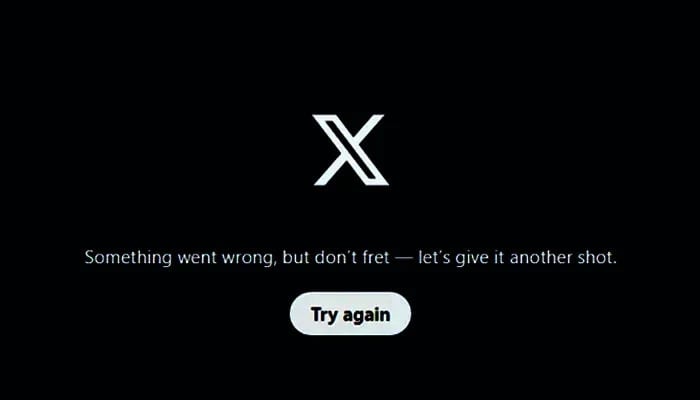X marks the ban
It has been two months since social media platform X (formerly Twitter) has been blocked/banned in Pakistan, the ban having come into effect during the caretaker government’s tenure. However, the caretakers had even then pretended as though the ban was not in place. When the new government took charge, it also looked the other way and pretended that X/Twitter could be accessed normally. Civil society, digital rights activists and journalists have ended up appealing to the courts to get the ban lifted. In this regard, the Sindh High Court has asked the government to restore X. In a case in front of the Islamabad High Court, now the interior ministry has finally said that the ban on X was necessary following its failure to address concerns regarding its “misuse”.
The justification given in the report submitted to the IHC says that the “failure of Twitter/X to adhere to the lawful directives of the government of Pakistan and address concerns regarding the misuse of its platform necessitated the imposition of a ban”. Many have asked the government about the notification that led to this ban, but the IHC was informed that the decision was taken after confidential reports from Pakistan’s intelligence and security agencies. The report also says that the “decision to impose a ban on Twitter/X in Pakistan was made in the interest of upholding national security, maintaining public order, and preserving the integrity of our nation” and that “hostile elements operating on Twitter/X have nefarious intentions to create an environment of chaos and instability, with the ultimate goal of destabilising the country and plunging it into some form of anarchy”.
In its first statement issued since the suspension of X in Pakistan in mid-February, the social media platform has said that it continues to work “with the Pakistani government to understand their concerns”. Thankfully, not everyone in government is in a state of denial. For example, PML-N leader Khawaja Saad Rafique has tweeted that the ban on X must end as it has not benefitted anyone and only led to international embarrassment. In this day and age, it is quite bizarre to claim that Pakistan’s national security is under threat because of a social media platform. If it is such a threat, then why is it that all politicians, government officials – including the prime minister of Pakistan – continue to use X and tweet both in Urdu and English, for the local and international audience. If this platform is indeed playing a part in ‘destabilizing’ the country, then no government official should have a presence there. Are we in Pakistan doomed to live in a regime where our freedoms are taken away because someone in the government or elsewhere thinks that the only way to fight one party’s propaganda is by banning X? If slander, defamation or inflammatory comments were the problem, it would have been simpler to just go after those comments. Why did the entire site have to be closed to the people? Also, things posted on the internet are, for better or for worse, forever. Does this mean restrictions can also be indefinite? Does the constitutional right to free expression really count for so little in a self-proclaimed democracy? Social media is indispensable to people’s power in the 21st century. It is not just where people get the news, but where they can become part of it and influence the narrative. Then again, maybe that is the problem.
-
 Jennifer Hudson Gets Candid About Kelly Clarkson Calling It Day From Her Show
Jennifer Hudson Gets Candid About Kelly Clarkson Calling It Day From Her Show -
 Shamed Andrew Was With Jeffrey Epstein Night Of Virginia Giuffre Assault
Shamed Andrew Was With Jeffrey Epstein Night Of Virginia Giuffre Assault -
 Shamed Andrew’s Finances Predicted As King ‘will Not Leave Him Alone’
Shamed Andrew’s Finances Predicted As King ‘will Not Leave Him Alone’ -
 Bad Bunny Faces Major Rumour About Personal Life Ahead Of Super Bowl Performance
Bad Bunny Faces Major Rumour About Personal Life Ahead Of Super Bowl Performance -
 Sarah Ferguson’s Links To Jeffrey Epstein Get More Entangled As Expert Talks Of A Testimony Call
Sarah Ferguson’s Links To Jeffrey Epstein Get More Entangled As Expert Talks Of A Testimony Call -
 France Opens Probe Against Former Minister Lang After Epstein File Dump
France Opens Probe Against Former Minister Lang After Epstein File Dump -
 Last Part Of Lil Jon Statement On Son's Death Melts Hearts, Police Suggest Mental Health Issues
Last Part Of Lil Jon Statement On Son's Death Melts Hearts, Police Suggest Mental Health Issues -
 Leonardo DiCaprio's Girlfriend Vittoria Ceretti Given 'greatest Honor Of Her Life'
Leonardo DiCaprio's Girlfriend Vittoria Ceretti Given 'greatest Honor Of Her Life' -
 Beatrice, Eugenie’s Reaction Comes Out After Epstein Files Expose Their Personal Lives Even More
Beatrice, Eugenie’s Reaction Comes Out After Epstein Files Expose Their Personal Lives Even More -
 Will Smith Couldn't Make This Dog Part Of His Family: Here's Why
Will Smith Couldn't Make This Dog Part Of His Family: Here's Why -
 Kylie Jenner In Full Nesting Mode With Timothee Chalamet: ‘Pregnancy No Surprise Now’
Kylie Jenner In Full Nesting Mode With Timothee Chalamet: ‘Pregnancy No Surprise Now’ -
 Laura Dern Reflects On Being Rejected Due To Something She Can't Help
Laura Dern Reflects On Being Rejected Due To Something She Can't Help -
 HBO Axed Naomi Watts's 'Game Of Thrones' Sequel For This Reason
HBO Axed Naomi Watts's 'Game Of Thrones' Sequel For This Reason -
 King Charles' Sandringham Estate Gets 'public Safety Message' After Andrew Move
King Charles' Sandringham Estate Gets 'public Safety Message' After Andrew Move -
 Lewis Capaldi Sends Taylor Swift Sweet Message After 'Opalite' Video Role
Lewis Capaldi Sends Taylor Swift Sweet Message After 'Opalite' Video Role -
 Brooklyn Beckham Plunges Victoria, David Beckham Into Marital Woes: ‘They’re Exhausted As It Seeps Into Marriage
Brooklyn Beckham Plunges Victoria, David Beckham Into Marital Woes: ‘They’re Exhausted As It Seeps Into Marriage




